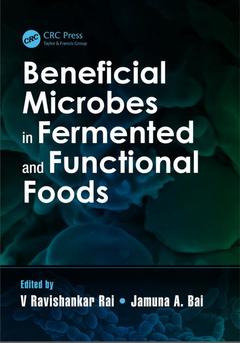Beneficial Microbes in Fermented and Functional Foods
Coordonnateurs : Rai V Ravishankar, Bai Jamuna A.

In recent years, the potential health benefits of fermented and functional foods have made them increasingly popular among consumers. A complete overview of the physiology and functional aspects of microbes present in fermented foods and used as functional foods, Beneficial Microbes in Fermented and Functional Foods explores recent advances and progress made in developing fermented and functional foods using molecular biology techniques. With contributions from international experts, the book explores advances in food technology with the prospective applications of microorganisms and their metabolites that can increase opportunities to develop natural substances as food and food ingredients in fermented and functional foods.
Divided into four sections and containing 30 chapters, the book takes an in-depth look at the role of microbes and their diversity in traditional and modern fermented and functional foods. It also examines the interaction between the different microflora present in fermented food products, development of starter cultures to improve the nutritional and sensory quality of fermented foods, and factors and processes affecting the safety of various fermented foods. The text then covers application of microbes present in fermented foods and used as functional foods?probiotics, prebiotics, and synbiotics. It explains the different bacteria and strains used as probiotics, their interaction with the other intestinal flora in the host, the health benefits conferred by them, and risks associated with their consumption.
The focus on progress and challenges in the technology development of probiotics, prebiotics, and synbiotic preparation makes this book especially useful. The complete and comprehensive overview of the physiology and functional aspects of the microbes present in fermented foods and used as fermented foods gives you a firm foundation for future research and development of new products and uses.
MICROBIOLOGY OF FERMENTED FOODS. Diversity of Lactic Acid Bacteria in Chinese Traditional Fermented Foods. Tailor-Made Starter Cultures for Preserving the Uniqueness of Traditional Cheeses. Starter and Adjunct Microbial Cultures Used in the Manufacture of Fermented and/or Cured or Ripened Meat and Dairy Products. Microbiological and Biochemical Characteristics of Spanish Fermented Sausages. Exploring Phage Ecology, Genetics, and Impact in Food Fermentations. Functional Fermented Whey Foods: Their Role in Human Health. Overview of the Functional Lactic Acid Bacteria in Fermented Milk Products. Significance of Biogenic Amines in Fermented Foods and Methods of Their Control. FUNCTIONAL FOODS: PROBIOTICS, PREBIOTICS, AND SYNBIOTICS. Probiotics in Health and Diseases. Probiotics and Prebiotics in Fruits and Vegetables: Technological and Sensory Aspects. Research and Development of Probiotic Products from Vegetable Bases: A New Alternative for Consuming Functional Food. Probiotic Bacteria in Functional Meat Products. Use of Encapsulation Technology for Improving the Viability of Probiotics. Microencapsulating Bioactives for Food. Use of High-Pressure Homogenization for Improving the Quality and Functionality of Probiotics. Role of Bifidobacteria in the Production of Bioactive Compounds and Detoxification of Harmful Compounds. Intestinal Microbiota as a Source of Probiotic Bifidobacterium Strains: Challenges and Opportunities for the Development of Functional Foods. Gastroprotective Effects of Bifidobacterium bifidum BF-1 and B. bifidum Strain Yakult. Bacillus Probiotics and Biologicals for Improving Animal and Human Health: Current Applications and Future Prospects. HEALTH BENEFITS OF PROBIOTICS AND FUNCTIONAL FOODS. Probiotics, Prebiotics, and Synbiotics for Gut Health Benefits. Probiotics: Interactions with Gut Microbiota and Emerging Trends. Health Benefits of Symbiotic Functional Food Products. Modulation of Gut Microflora in the Prevention of Atherosclerosis and Cancer Using Probiotics and Prebiotics. Potential Application of Probiotics in Improving Human Health and Enhancing Brain Function and Memory. Probiotics: Live Medicines in Human Gut. MICROBES IN FERMENTED AND FUNCTIONAL FOODS. Role of Lactic Acid Bacteria in Wine. Probiotics: Potential Role in Protection against Cancer Driven by Dietary Xenobiotics. Role of Microbes and Their Diversity in Fermented Foods. Application of Adjunct Cultures and Their Influence on the Sensory Properties of Hard and Semi-Hard Cheese Varieties. Application of Dairy Propionic Acid Bacteria in Fermented Foods and Probiotics.
V Ravishankar Rai earned his MSc and PhD from the University of Mysore, India. Currently, Dr. Rai is working as a Professor in the Department of Studies in Microbiology, University of Mysore, India. He was awarded a fellowship from the UNESCO Biotechnology Action Council, Paris (1996), the Indo-Israel Cultural Exchange Fellowship (1998), the Biotechnology Overseas Fellowship, Government of India (2008), and the Indo-Hungarian Exchange Fellowship (2011) Indian National Academy Fellowship (2015) and Cardiff Incoming Visiting Fellowship (2017). Presently, he is the coordinator for the Department of Science and Technology, Promotion of University Research and Scientific Excellence and University Grants Commission innovative programs.
Jamuna A. Bai has completed her MSc and PhD in Microbiology from University of Mysore, India. She is working as a Researcher in UGC sponsored University with Potential Excellence Project, University of Mysore, India. She has previously worked as ICMR Senior Research Fellow and carried a research work on food safety, role of quorum sensing and biofilms in food-related bacteria and developing quorum-sensing inhibitors. Her research interests also include antimicrobial application of functionalized nanomaterials against food-borne pathogens.
Date de parution : 12-2014
17.8x25.4 cm
Thèmes de Beneficial Microbes in Fermented and Functional Foods :
Mots-clés :
Gut Microbiota; Intestinal Microbiota; lactic; Log CFU; acid; Starter Cultures; bacteria; Probiotic Strains; probiotic; strains; Delbrueckii Subsp; starter; Fermented Milks; cultures; Lactic Acid Bacteria; gut; Probiotic Microorganisms; microbiota; Lab Strain; milks; Dry Fermented Sausages; Biogenic Amine Accumulation; Fermented Foods; BA Formation; Adjunct Cultures; BAs; Rhamnosus GG; Probiotic Cultures; Ph Il; Lactis Subsp; High Bile Salt Concentrations; Ta Ge; Thermophilic Lab; PCR Amplication



